The demand for canvas bags in Japan is expected to grow from USD 64.9 billion in 2025 to USD 65.2 billion by 2035, reflecting a compound annual growth rate (CAGR) of 5.8%. Canvas bags are increasingly popular as eco-friendly, durable alternatives to single-use plastic bags. As consumer preferences shift toward durability and businesses seek to meet regulatory requirements, canvas bags are gaining broader adoption across sectors such as retail, foodservice, and promotions. The growing demand for reusable packaging solutions and the push for more environmentally responsible products are key drivers of this trend.
The rising concern about plastic waste is fueling the shift toward reusable alternatives, with plastic bag bans being implemented in various regions. These regulations are prompting businesses and consumers to adopt eco-friendlier solutions, such as canvas bags. The clean-label movement and consumer awareness of the environmental impact of disposable plastic bags are further accelerating the demand for canvas bags. As eco-conscious behavior becomes more prevalent, the adoption of canvas bags is expected to continue expanding in Japan.
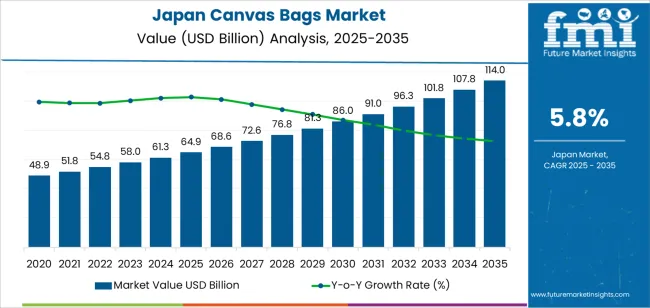
Between 2025 and 2030, the demand for canvas bags in Japan is expected to grow steadily, from USD 64.9 billion to USD 65.2 billion. This period will see modest year-on-year (YoY) growth, driven by the ongoing consumer shift toward eco-friendly packaging and a growing focus on durability. Small incremental increases in demand will occur as businesses and consumers increasingly adopt reusable alternatives in response to environmental regulations and rising concerns about plastic waste. The consistent YoY growth reflects a stable but gradual shift towards eco-friendlier products, with canvas bags becoming an integral part of daily life for eco-conscious shoppers and brands aiming to promote green initiatives.
From 2030 to 2035, the YoY growth rate for canvas bags is expected to accelerate as the demand for green packaging solutions becomes more mainstream. With durability becoming an even higher priority, consumer behavior will increasingly focus on environmentally friendly options. By 2035, the demand for canvas bags will experience a more significant YoY increase, supported by stronger government policies, including plastic bags, and the growing trend of eco-conscious consumer behavior. The rising popularity of branded reusable products will contribute to the rapid expansion of canvas bag use across various sectors, including retail and foodservice. This phase will reflect a sharp rise in demand, as businesses and consumers continue to align with global durability goals.
| Metric | Value |
|---|---|
| Demand for Canvas Bags in Japan Value (2025) | USD 64.9 billion |
| Demand for Canvas Bags in Japan Forecast Value (2035) | USD 114.1 billion |
| Demand for Canvas Bags in Japan Forecast CAGR (2025 to 2035) | 5.8% |
The demand for canvas bags in Japan is rising as consumers and businesses seek eco-friendlier alternatives to single-use plastic bags. Canvas bags, known for their durability, reusability, and natural fiber composition, are increasingly popular in retail, grocery stores, and fashion industries. With growing environmental awareness and the increasing focus on reducing plastic waste, canvas bags are becoming a preferred choice for both consumers and businesses in Japan.
A key driver of this growth is Japan’s strong push toward durability. Many cities and regions have implemented regulations, such as plastic bag bans or charges for plastic bags, prompting consumers to turn to reusable options. Canvas bags, being eco-friendly and versatile, are well-positioned to meet these needs. As consumer preferences shift toward environmentally responsible products, the demand for high-quality, reusable canvas bags is expected to continue rising.
The growing trend of eco-conscious fashion is also contributing to the demand for canvas bags in Japan. As consumers increasingly prioritize eco-friendly materials in their fashion and lifestyle choices, canvas bags are gaining popularity not only for shopping but also as a stylish accessory. With a rising focus on reducing plastic waste across various sectors, canvas bags are seen as a reliable, long-lasting solution. As environmental concerns continue to drive consumer behavior, the demand for canvas bags in Japan is expected to see steady growth through 2035.
Demand for canvas bags in Japan is segmented by type, end use, and weight. By type, demand is divided into canvas tote bags, backpacks, canvas sling bags, grocery bags, gift bags, and others (beach bags, etc.). The demand is also segmented by end use, including shopping (grocery, retail), office, traveling, schools/colleges, and others (gym, sports). In terms of weight, demand is divided into 11 to 15 oz, 6 to 10 oz, 16 to 20 oz, less than 5 oz, and more than 20 oz, with the 11 to 15 oz weight range being the most popular. Regionally, demand is divided into Kanto, Kinki, Chubu, Kyushu & Okinawa, Tohoku, and the Rest of Japan.
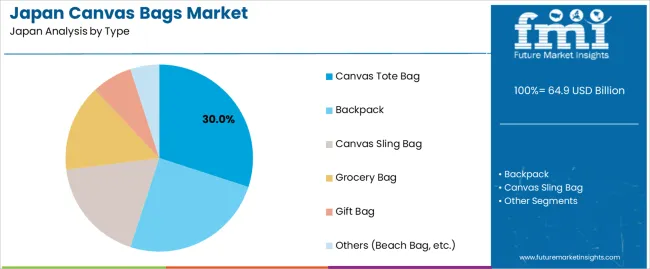
Canvas tote bags account for 30% of the demand for canvas bags in Japan. These bags are favored for their versatility, durability, and eco-friendly attributes. Canvas tote bags are widely used for a variety of purposes, including shopping, carrying groceries, and even as casual bags for daily use. The spacious design and sturdy material make them an ideal choice for consumers who prioritize both functionality and durability. The growing focus on reducing plastic waste has made canvas tote bags the go-to option for environmentally conscious shoppers, especially in grocery stores and retail environments. The ability to customize and brand these bags for promotional purposes further increases their popularity among businesses. With increasing demand for eco-friendly and reusable products, canvas tote bags will continue to dominate the canvas bag segment in Japan.
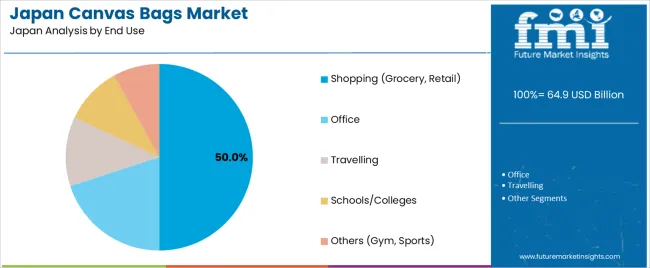
Shopping (grocery, retail) accounts for 50% of the demand for canvas bags in Japan. With the growing emphasis on durability and reducing plastic waste, canvas bags have become a popular choice for shoppers, especially in grocery stores and retail outlets. Canvas bags are strong, durable, and reusable, making them ideal for carrying groceries, clothing, and other retail purchases. The shift towards environmentally responsible practices, along with regulations on single-use plastic bags in many retail settings, has driven the widespread adoption of canvas bags. Their large, durable nature allows them to carry heavy loads without breaking, providing a reliable solution for daily shopping needs. As Japanese consumers continue to prioritize eco-friendly alternatives, canvas bags will remain the preferred option for shopping, ensuring their continued dominance in the industry.
In Japan, demand for canvas bags is growing due to heightened consumer interest in reusable carry solutions, minimalist design aesthetics, and durable everyday formats. Retailers and lifestyle brands are offering cotton canvas totes, branded printed bags and reusable carry‑solutions as part of their retail experience and promotional packaging. Growth of e‑commerce, lifestyle retailing and gifting is supporting uptake of canvas bags. Restraints include higher cost of cotton and production compared with simple plastic or non‑woven alternatives, limited domestic manufacturing capacity for custom‑printed canvas runs, and inertia in consumer behaviour where lightweight disposable bags are still widely used.
In Japan, demand for canvas bags is rising because retailers and consumers both favour reusable, durable and design‑rich carry options as part of lifestyle and brand engagement. With many retail chains and fashion brands providing canvas bags for shopping, gifting or as promotional items, usage is expanding. The regulatory and consumer push to reduce single‑use plastic packaging further supports canvas‑bag adoption. Japanese urban consumers in cities like Tokyo and Osaka favour high‑quality, locally styled bags that blend functionality with design, making canvas formats attractive for shopping, daily use and brand‑promotion.
Technological advances in textile processing and printing are helping boost demand for canvas bags in Japan. Improved canvas fabric variants (lighter-weight, blended fibres) provide strong but stylish options. Digital printing and customisation techniques allow retailers and brands to offer limited-edition or branded canvas bags, enhancing consumer appeal. Automation in cut‑and‑sew and finishing shortens lead‑times for custom runs, supporting flexible production. These innovations make canvas bags more viable for retail and promotional use, enabling Japanese manufacturers and converters to deliver higher quality, more customised carry options that meet design-conscious consumer expectations.
Despite favourable conditions, the canvas‑bag industry in Japan faces several challenges. One major barrier is cost: higher-quality cotton canvas bags and custom printing raise unit cost compared to budget-friendly plastic or non‑woven alternatives, limiting appeal in price‑sensitive segments. Another challenge is consumer behaviour: while there is growing awareness of reusable bags, many shoppers still rely on disposable bags for convenience, and change in habit can be slow. Supply‑chain and manufacturing constraints such as fluctuating cotton prices, limited capacity for custom‑printed runs, and longer production times also restrict large‑scale adoption. Ensuring the long‑term usage and durability of canvas bags is critical to justify investment in reusable formats.
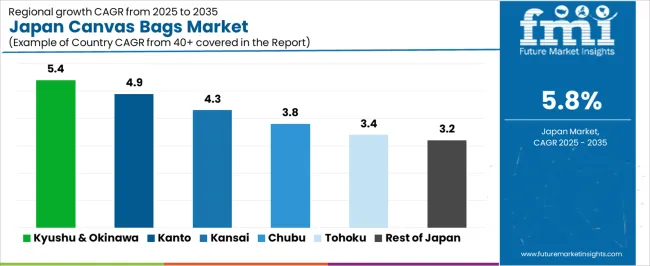
| Region | CAGR (%) |
|---|---|
| Kyushu & Okinawa | 5.4% |
| Kanto | 4.9% |
| Kinki | 4.3% |
| Chubu | 3.8% |
| Tohoku | 3.4% |
| Rest of Japan | 3.2% |
Demand for canvas bags in Japan is growing steadily across all regions, with Kyushu & Okinawa leading at a 5.4% CAGR. Kanto follows closely with a 4.9% CAGR, supported by its large population and urban areas, where eco-friendly products are increasingly popular. Kinki experiences a 4.3% CAGR, with demand driven by the region's focus on durability in the retail and fashion sectors. Chubu shows a 3.8% CAGR, with demand for canvas bags driven by increasing consumer awareness of environmental issues and a shift toward eco-friendlier lifestyle choices. Tohoku experiences a 3.4% CAGR, supported by regional efforts to reduce plastic usage and promote eco-friendly alternatives. The Rest of Japan sees a 3.2% CAGR, with moderate demand growth in smaller urban and rural areas.
Kyushu & Okinawa lead Japan in demand for canvas bags, with a 5.4% CAGR. The demand is primarily driven by the growing focus on durability and eco-conscious living, particularly in Okinawa, where environmental preservation and waste reduction are key community priorities. Local initiatives aimed at reducing plastic use are pushing consumers and businesses in Kyushu & Okinawa to adopt eco-friendlier alternatives like canvas bags. The region’s strong agricultural sector, which emphasizes locally grown products, also drives the use of canvas bags for grocery shopping and packaging. The increasing popularity of eco-tourism in Okinawa, where reusable canvas bags are seen as an eco-friendly option for visitors, further supports demand. As environmental concerns continue to rise and more local businesses promote eco-friendly products, canvas bags are expected to see continued growth in the region.
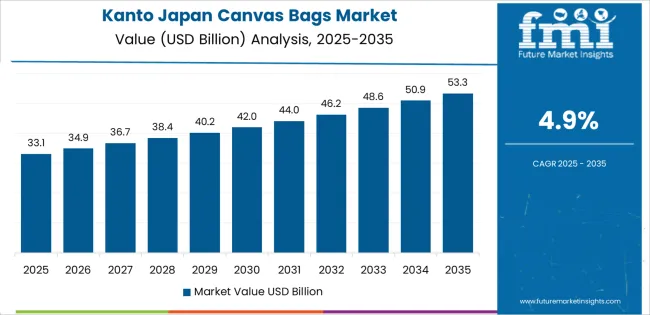
Kanto is experiencing strong demand for canvas bags, with a 4.9% CAGR. This demand is driven by the region’s large urban population and growing interest in eco-friendly products. Tokyo, being the major commercial and cultural hub, has seen a significant rise in consumer preference for reusable bags as a part of the eco-conscious movement. With the government’s strong push towards reducing plastic usage, Kanto’s retailers, both small and large, are increasingly offering canvas bags as an alternative to plastic bags. As more consumers seek ways to reduce their environmental impact, canvas bags are becoming popular not just for shopping but also as fashion accessories. The rise of eco-friendly fashion and lifestyle brands in Kanto has further fueled the demand for canvas bags. As durability continues to be a driving force in the region, demand for canvas bags is expected to remain strong.
Kinki is seeing steady demand for canvas bags, with a 4.3% CAGR. The demand is largely driven by the region’s focus on durability, particularly in Osaka and Kyoto, where eco-friendly initiatives are being implemented by local governments and businesses. Kinki’s growing retail and fashion industries have contributed to the rise in popularity of canvas bags as both practical and stylish alternatives to plastic. The region’s emphasis on reducing plastic waste in both the fashion and food sectors is driving the adoption of canvas bags. Kinki’s active participation in national campaigns to reduce single-use plastic products has further pushed the demand for reusable items like canvas bags. As consumer awareness of environmental issues increases, Kinki’s residents are increasingly choosing canvas bags for shopping, leading to a steady rise in demand. With continued focus on durability, the region’s demand for canvas bags is expected to grow.
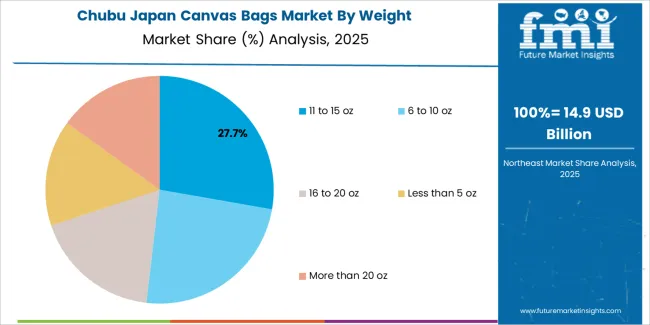
Chubu is experiencing moderate demand for canvas bags, with a 3.8% CAGR. The demand in this region is driven by the increasing focus on durability, especially in urban centers like Nagoya. With rising awareness about environmental issues, consumers in Chubu are shifting towards eco-friendly alternatives to plastic, including canvas bags. Local retailers and fashion brands are increasingly offering canvas bags as part of their product range to meet the demand for eco-friendly products. As the region’s industries, including food processing and retail, begin to focus more on reducing plastic waste, the adoption of reusable products like canvas bags is on the rise. The growth rate in Chubu is slower than in more urbanized regions like Kanto, but the steady increase in consumer interest in eco-friendly living is contributing to the growing demand for canvas bags. As the region continues to embrace eco-conscious initiatives, demand for canvas bags will continue to grow.
Tohoku is seeing steady demand for canvas bags, with a 3.4% CAGR. The region’s demand is largely driven by local efforts to reduce plastic use and promote eco-friendly alternatives. As Tohoku’s population becomes increasingly aware of environmental issues, there is a growing shift toward eco-friendly products, including canvas bags. Local initiatives in Tohoku’s municipalities, focused on reducing waste and encouraging recycling, have played a significant role in driving demand for reusable bags. The rise of health-conscious and environmentally aware consumers in Tohoku has increased the use of canvas bags, especially in retail and grocery shopping. The region’s relatively slower growth in demand for canvas bags compared to urban areas like Kanto can be attributed to its smaller-scale retail environment, but as durability becomes a higher priority, demand for eco-friendly products is expected to grow steadily in Tohoku.
The Rest of Japan is seeing moderate demand for canvas bags, with a 3.2% CAGR. This growth is driven by regional efforts to reduce plastic waste and promote eco-friendly alternatives. Local governments in smaller cities and rural areas are increasingly encouraging consumers to use reusable bags, including canvas bags, in an effort to reduce plastic waste. While the Rest of Japan may not experience the same level of demand as larger urban areas like Kanto and Kinki, there is a steady shift towards eco-conscious consumer behavior in these regions. Small retailers, particularly in rural areas, are also adopting canvas bags to meet consumer demand for eco-friendlier shopping options. As consumer awareness about environmental issues continues to grow, demand for canvas bags in the Rest of Japan is expected to rise steadily, contributing to the overall national growth of this eco-friendly product.
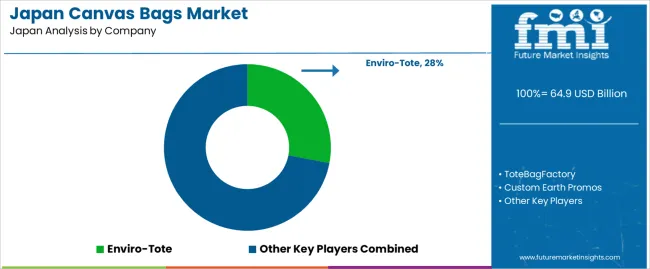
In Japan, demand for canvas bags is being driven by both lifestyle trends and durability priorities. Consumers are increasingly choosing reusable bags made from sturdy materials like canvas for shopping, work, school and leisure use. The industry is supported by regulations limiting single‑use plastics, rising retail consumption, and brand‑owners seeking durable, high‑visibility promotional items. As a result, canvas bags are becoming both practical carry items and branding tools tailored for Japan’s retail, foodservice and promotional segments.
Key companies active in this segment include Enviro‑Tote with a 28.0% share, ToteBagFactory, Custom Earth Promos, and EcoBags. Enviro‑Tote holds a leading position thanks to its strong offerings of custom‑printed, reusable canvas bags, established relationships with retailers and promotional customers, and efficient supply‑chain support. The other suppliers differentiate themselves via material variety (organic cotton, heavier weight canvas), printing and finishing options (eco‑inks, digital graphics), rapid custom‑order fulfilment and niche focus on eco-friendly brand‑packaging.
Competitive dynamics in Japan’s canvas bag industry are shaped by several forces. A major driver is the regulatory and consumer push away from disposable plastic bags, making reusable alternatives more attractive. Another driver is the branding and promotional value of canvas bags brands see them as visible, high‑quality touch‑points that reflect durability credentials.
The industry faces challenges including cotton or fabric cost fluctuations, competition from other reusable materials (e.g., recycled plastics, non‑wovens), and the need for local sizing, print customization and rapid turnaround for Japanese users. Suppliers who can combine material quality, print versatility, fast logistics, and strong local customer‑service will be best positioned to capture growth in Japan’s canvas bag segment.
| Items | Values |
|---|---|
| Quantitative Units (2025) | USD billion |
| Type | Canvas Tote Bag, Backpack, Canvas Sling Bag, Grocery Bag, Gift Bag, Others (Beach Bag, etc.) |
| Weight | 11 to 15 oz, 6 to 10 oz, 16 to 20 oz, Less than 5 oz, More than 20 oz |
| End Use | Shopping (Grocery, Retail), Office, Travelling, Schools/Colleges, Others (Gym, Sports) |
| Region | Kyushu & Okinawa, Kanto, Kinki, Chubu, Tohoku |
| Countries Covered | Japan |
| Key Companies Profiled | Enviro-Tote, ToteBagFactory, Custom Earth Promos, EcoBags |
| Additional Attributes | Dollar sales by type and weight; regional CAGR and adoption trends; demand trends in canvas bags; growth in retail, office, and travel sectors; technology adoption for eco-friendly packaging; vendor offerings including custom bags, eco-friendly materials, and packaging solutions; regulatory influences and industry standards |
The demand for canvas bags in Japan is estimated to be valued at USD 64.9 billion in 2025.
The market size for the canvas bags in Japan is projected to reach USD 114.0 billion by 2035.
The demand for canvas bags in Japan is expected to grow at a 5.8% CAGR between 2025 and 2035.
The key product types in canvas bags in Japan are canvas tote bag, backpack, canvas sling bag, grocery bag, gift bag and others (beach bag, etc.).
In terms of weight, 11 to 15 oz segment is expected to command 28.0% share in the canvas bags in Japan in 2025.






Our Research Products

The "Full Research Suite" delivers actionable market intel, deep dives on markets or technologies, so clients act faster, cut risk, and unlock growth.

The Leaderboard benchmarks and ranks top vendors, classifying them as Established Leaders, Leading Challengers, or Disruptors & Challengers.

Locates where complements amplify value and substitutes erode it, forecasting net impact by horizon

We deliver granular, decision-grade intel: market sizing, 5-year forecasts, pricing, adoption, usage, revenue, and operational KPIs—plus competitor tracking, regulation, and value chains—across 60 countries broadly.

Spot the shifts before they hit your P&L. We track inflection points, adoption curves, pricing moves, and ecosystem plays to show where demand is heading, why it is changing, and what to do next across high-growth markets and disruptive tech

Real-time reads of user behavior. We track shifting priorities, perceptions of today’s and next-gen services, and provider experience, then pace how fast tech moves from trial to adoption, blending buyer, consumer, and channel inputs with social signals (#WhySwitch, #UX).

Partner with our analyst team to build a custom report designed around your business priorities. From analysing market trends to assessing competitors or crafting bespoke datasets, we tailor insights to your needs.
Supplier Intelligence
Discovery & Profiling
Capacity & Footprint
Performance & Risk
Compliance & Governance
Commercial Readiness
Who Supplies Whom
Scorecards & Shortlists
Playbooks & Docs
Category Intelligence
Definition & Scope
Demand & Use Cases
Cost Drivers
Market Structure
Supply Chain Map
Trade & Policy
Operating Norms
Deliverables
Buyer Intelligence
Account Basics
Spend & Scope
Procurement Model
Vendor Requirements
Terms & Policies
Entry Strategy
Pain Points & Triggers
Outputs
Pricing Analysis
Benchmarks
Trends
Should-Cost
Indexation
Landed Cost
Commercial Terms
Deliverables
Brand Analysis
Positioning & Value Prop
Share & Presence
Customer Evidence
Go-to-Market
Digital & Reputation
Compliance & Trust
KPIs & Gaps
Outputs
Full Research Suite comprises of:
Market outlook & trends analysis
Interviews & case studies
Strategic recommendations
Vendor profiles & capabilities analysis
5-year forecasts
8 regions and 60+ country-level data splits
Market segment data splits
12 months of continuous data updates
DELIVERED AS:
PDF EXCEL ONLINE
Canvas Bags Market Insights - Growth & Demand Forecast 2025 to 2035
Canvas and Muslin Bags Market Size, Share & Forecast 2025 to 2035
Leading Providers & Market Share in Canvas and Muslin Bags
Demand for Canvas Primer in Japan Size and Share Forecast Outlook 2025 to 2035
Demand for Cassava Bags in Japan Size and Share Forecast Outlook 2025 to 2035
Japan Faith-based Tourism Market Size and Share Forecast Outlook 2025 to 2035
Japan Sports Tourism Market Size and Share Forecast Outlook 2025 to 2035
Japan Respiratory Inhaler Devices Market Size and Share Forecast Outlook 2025 to 2035
Japan Halal Tourism Market Size and Share Forecast Outlook 2025 to 2035
Japan Automated People Mover Industry Size and Share Forecast Outlook 2025 to 2035
Japan Automotive Load Floor Industry Analysis Size and Share Forecast Outlook 2025 to 2035
Japan Food Cling Film Market Size and Share Forecast Outlook 2025 to 2035
Japan Polypropylene Packaging Films Market Size and Share Forecast Outlook 2025 to 2035
Canvas Roll Market Size and Share Forecast Outlook 2025 to 2035
Japan Probiotic Yogurt Market is segmented by product type, source type, nature type, flavor type, fat content, sales channel and key city/province through 2025 to 2035.
japan Tortilla Market - Growth, Trends and Forecast from 2025 to 2035
Japan Cosmetics ODM Market Analysis - Size, Share & Trends 2025 to 2035
Japan Automotive Turbocharger Market Insights – Demand, Size & Industry Trends 2025–2035
Japan Yeast Market Insights – Demand, Size & Industry Trends 2025–2035
Japan Green and Bio-based Polyol Market Insights – Demand, Size & Industry Trends 2025–2035

Thank you!
You will receive an email from our Business Development Manager. Please be sure to check your SPAM/JUNK folder too.
Chat With
MaRIA